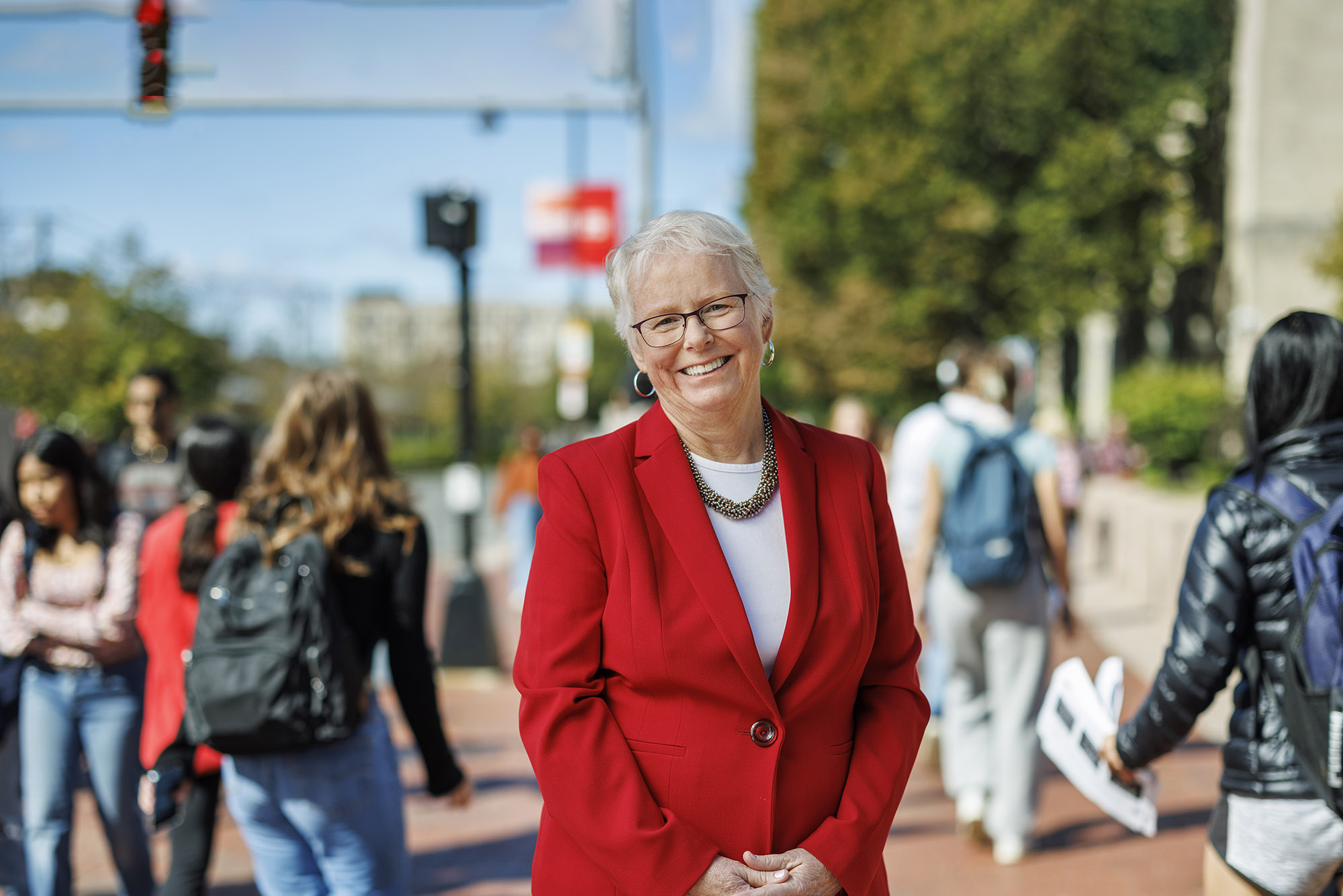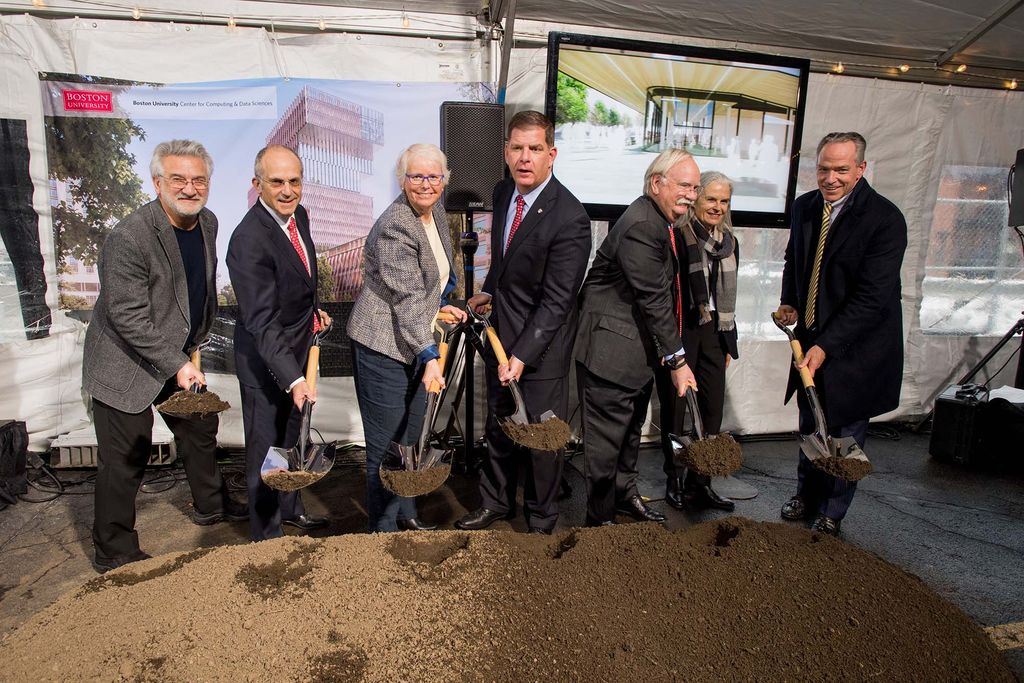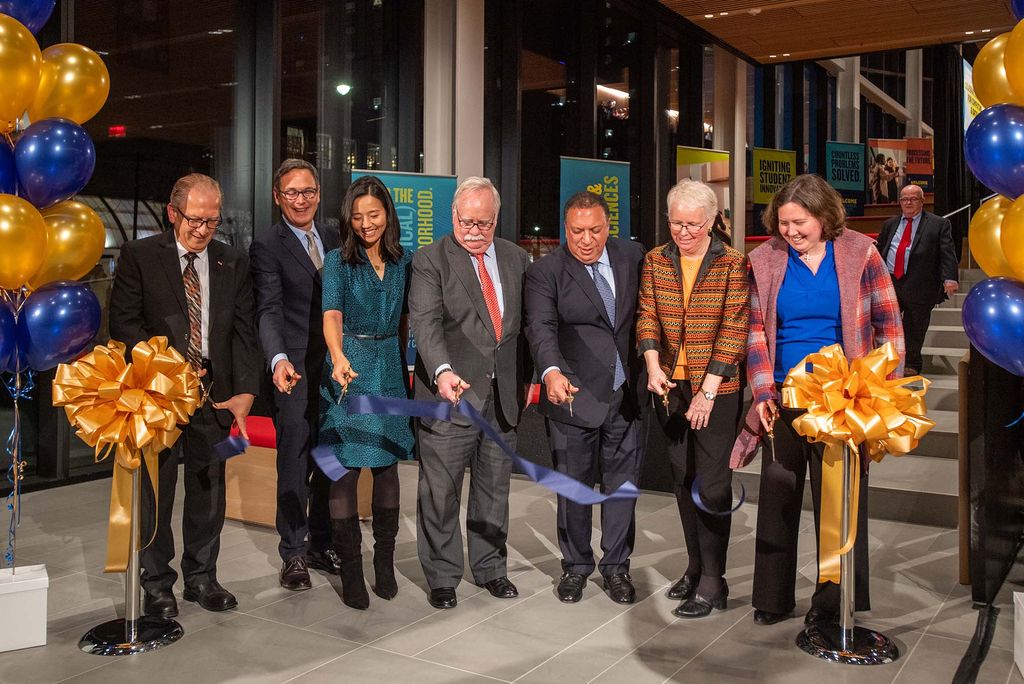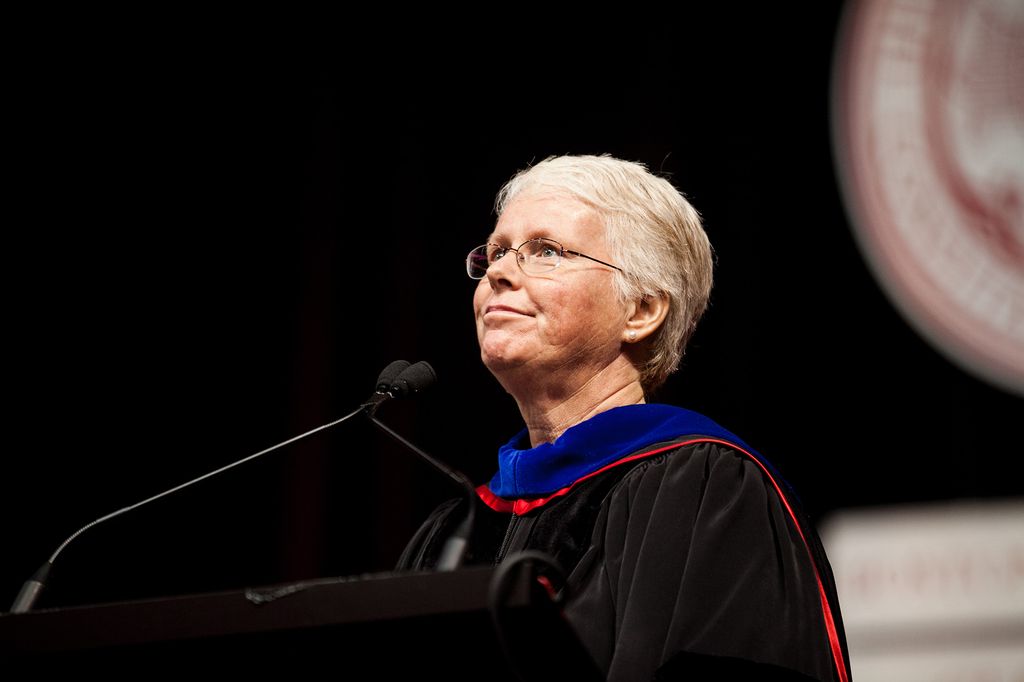Jean Morrison to Step Down as BU Provost July 1
President Brown says he will appoint interim person to the position; deans praise Morrison for her integrity, compassion

BU President Robert A. Brown calls Morrison “the best university administrator that I have had the pleasure of working with in my almost 40 years in university leadership.” Photo by Bob O’Connor
Jean Morrison to Step Down as BU Provost July 1
President Brown says he will appoint interim person to the position; deans praise Morrison for her integrity, compassion
If you glance around Boston University, you will see Jean Morrison’s fingerprints on almost every corner and in almost every classroom: The core curriculum general education program for students, the BU Hub. The new Faculty of Computing & Data Sciences. The Frederick S. Pardee School of Global Studies. The merger that brought Wheelock College into BU. Questrom’s wildly successful online MBA program. The launch of BU Virtual to expand the University’s online offerings. The most diverse group of deans in the school’s history. The hiring of noted scholar Ibram X. Kendi. The Newbury Center for first-generation students. The explosion of BU as a dynamic research institution. And the list goes on.
Morrison was instrumental in all of those initiatives during her 12 years as BU’s provost and chief academic officer under President Robert A. Brown. On Friday, the University announced that Morrison will step down from the position this summer. Her last day will be July 1. Morrison, a College of Arts & Sciences professor of Earth and environment, came to BU in 2011 from the University of Southern California to fill BU’s second-highest-ranking administrative position. She will take a yearlong sabbatical before returning to BU as part of the faculty she’s led for more than a decade.
(Brown says that because a search is underway for his own successor as BU president, it would be inappropriate for him to hire a permanent provost, so he will designate an interim to begin on July 1.)
“Simply put, Jean is the best university administrator that I have had the pleasure of working with in my almost 40 years in university leadership,” Brown wrote in a letter to the BU community announcing her departure. “Her leadership and the work of her colleagues in the Office of the University Provost have been responsible for many of the critical transformations in the University.”
Her leadership and the work of her colleagues in the Office of the University Provost have been responsible for many of the critical transformations in the University.
In an interview with BU Today, Brown says: “In terms of guiding the academic enterprise, as president I have relied on her tremendously to do that. She’s done that with as much skill as I’ve ever seen.” He praised Morrison’s judgment in handling “the myriad of issues research universities face” and says he talks to her more frequently than anybody because they have “an easygoing relationship where we can talk honestly and openly about anything.”
Academic excellence
During Morrison’s BU tenure, the University soared to unprecedented heights as an academic and research powerhouse.
Morrison is herself a metamorphic petrologist whose own research explored Earth’s crust and its evolution. She was instrumental in launching BU’s Office of Research, in elevating Gloria Waters to vice president and associate provost for research, and in helping lift the University to become a top-tier urban research institution with approximately $600 million in funding flowing through each year.
Beyond that, the BU educational experience broadened dramatically under her leadership.
The opening of Pardee positioned BU to be a leading voice on international affairs and relations at a time when the world was increasingly global in nature. As digital technology invaded every aspect of life, she was a leading force behind helping to build the faculty to fill the new Center for Computing & Data Sciences, which included the appointment of Azer Bestavros as BU’s inaugural associate provost for Computing & Data Sciences. During a time when police nationwide came under fire for a number of killings of Black men and women, sparking protests, Morrison was instrumental in hiring leading antiracism scholar Kendi to launch the Center for Antiracist Research at the University. And she was at the forefront of the merger between Wheelock College and BU, guiding the process of folding Wheelock faculty into the University to assure a smooth transition for the new school.

Morrison was among the central figures on hand in 2019 for the groundbreaking of the BU Center for Computing & Data Sciences. Photo by Cydney Scott.

Morrison was also there for the ribbon cutting of the BU Center for Computing & Data Sciences building in December 2022. Photo by Cydney Scott.
In the left photo, Morrison (third from left) was among the central figures on hand in 2019 for the groundbreaking of the BU Center for Computing & Data Sciences building. In the right photo, Morrison (second from right) was also there for the ribbon cutting officially opening the building in December 2022. Photos by Cydney Scott
At BU, Brown singled out her work with the faculty, the most important and most challenging role of a university provost.
“Those of us who work closely with Jean have witnessed daily the wise, informed, and reflective leadership she brings to the innumerable decisions, big and small, a provost must make,” he wrote in his letter to the BU community. “Her leadership skills were on full display as she guided our academic community through the pandemic and as she led the crafting of our 2030 Strategic Plan.
Most recently, Morrison played an outsized role during the COVID-19 pandemic, which forced colleges across the country to pivot to remote education almost overnight. She led the effort for BU to develop a hybrid classroom model, with both remote and in-person options, that focused on helping students maintain strong connections with faculty during a period of unprecedented upheaval.
Deans praise her compassion, commitment to diversity
That empathy, combined with attention to detail, is why many deans at BU say she was the best provost they’d ever worked with.
One of Morrison’s hires, Sandro Galea, dean and Robert A. Knox Professor at BU’s School of Public Health, says he came to the University in part because he felt inspired by Morrison’s “commitment, integrity, and dedication” to making BU a great place to work. He says anytime he encountered a challenge, she was the person he turned to for advice to navigate his way forward.
“Jean has a conciliatory, compassionate style,” Galea says. “She is an excellent listener. She makes people feel heard. And when you feel heard, you want to be a part of filling whatever holes have to be filled. That’s the job of any leader, and particularly at a big university that’s so diverse with multiple stakeholders.”
Angela Onwuachi-Willig, dean of BU School of Law and the first Black woman dean of a top-20 law school, says the diverse group of deans that Morrison has hired shows her ability to find and recruit top-tier leaders. “Having an eye for talent to take BU to the next level is an extraordinary talent Jean has,” says Onwuachi-Willig, LAW’s Ryan Roth Gallo and Ernest J. Gallo Professor. “You won’t find a more diverse group of deans at an AAU (Association of American Universities) institution. She really walks the walk on diversity, equity, and inclusion. It is a priority and major commitment of hers. She is a courageous leader on those matters.”
David Chard, dean of Wheelock College of Education & Human Development, says Morrison’s role in the merger of Wheelock into BU in 2018 showed a side of her that is perhaps underappreciated.
“Part of her job was to explain what could be done and what wasn’t possible,” Chard says. “She lent a wise oversight in the merger process, and these mergers are new to higher education. I think what I appreciated was there was a point when she realized she could trust me to not make crazy decisions, and she let go. And that’s a sign of a really strong leader.”
Another sign, he says, is her ability to balance the desires and ambitions of deans with the realities of financial restrictions. “The word that comes out most frequently from a provost is often ‘no,’” he says. “You have to balance the budget and keep the academic quality of the institution without squashing innovation and enthusiasm. She has helped me to advance key initiatives within Wheelock by letting me be creative and not prematurely ending my enthusiasm.”
A wise leader and a mentor for women
Brown noted that the pool of deans at BU now is a reflection of Morrison, who rose up in her career through her science background in the 1980s and 1990s, when it was especially difficult for women in science to reach prominent positions.
“She was a product of that generation and feels strongly about looking for talent, she’s got a great track record in hiring a diverse set of leaders,” he says. “It makes it clear that everybody can thrive and succeed here. That’s kept our candidate pool strong. I give her tremendous credit for that.”
Morrison’s white-paneled office on the eighth floor of One Silber Way is a reflection of both her career and her personal life, from growing up in upstate New York to her time spent in California, where she raised her two children. There are rare crystals, textbooks, and reference guides, and a rock that doubles as a book end. An inscribed rock hammer used to break off weathered surfaces of rock sits on one shelf. There is also the plaque she received when she won USC’s highest teaching honor. The inscription reads: “An accomplished teacher and respected researcher, [Morrison] possesses an extraordinary ability to share her excitement about scientific discoveries. She cares deeply about teaching and effectively demystifies science in order to convey the power and mystery of nature…. She is equally at home in the classroom, in the laboratory, and in the field.”

She really walks the walk on diversity, equity, and inclusion. It is a priority and major commitment of hers. She is a courageous leader on those matters.
Morrison, shown here speaking to the Class of 2016 at the annual Matriculation ceremony at Agganis Arena, was praised by BU deans for her integrity and her compassion. Photo by Kristyn Ulanday
If there has been a hallmark throughout Morrison’s career, it has been her mentoring and promotion of women into positions of leadership. At USC, she served as director of the university’s Women in Science and Engineering program. And at BU, as the first woman provost, she has overseen a dramatic shift in the makeup of the 17 deans of the schools and colleges, which now include seven women deans, more than at any other time in BU’s history.
Addressing challenges head-on
One of the most challenging events during Morrison’s BU tenure involved accusations of harassment of women against a College of Arts & Sciences professor of Earth and environment. A yearlong investigation eventually led to his termination in 2019, but it also forced the University to look inward at its policies and practices in fighting sexual harassment, mainly against women, committed by federally funded researchers.
Morrison was invited to testify in Washington before a US House Committee on Science, Space, and Technology in June of that year, where she addressed how the incident “reverberated powerfully at BU,” and said it had forced the University to “redouble our efforts to combat gender-based harassment.”
Speaking as both the provost, and as the mother of a daughter who was pursuing her own PhD at the time, Morrison told the committee: “It does no good to invest in programs to encourage young girls to pursue STEM studies if they end up in a research environment that drives them away.”
The case prompted BU to join almost 60 other institutions in launching the National Academies Action Collaborative on Preventing Sexual Harassment in Higher Education, an effort to let colleges learn from one another and bring change to their academic environments.
During a politically divisive period when issues of diversity, equity, and inclusion moved front and center for organizations and businesses, Morrison helped launch and expand BU Diversity & Inclusion. Today, under Victoria Sahani, associate provost for community and inclusion, the office works closely with BU’s 17 schools and colleges to create a more welcoming campus environment and to help recruit, its webpage says, “world-class students, staff, and faculty whose experiences and viewpoints embolden the academic endeavor.”
Onwuachi-Willig says that an undeniable part of Morrison’s legacy at BU will be her unwavering commitment to supporting research that “improves the everyday lives of everyday people.”

Comments & Discussion
Boston University moderates comments to facilitate an informed, substantive, civil conversation. Abusive, profane, self-promotional, misleading, incoherent or off-topic comments will be rejected. Moderators are staffed during regular business hours (EST) and can only accept comments written in English. Statistics or facts must include a citation or a link to the citation.